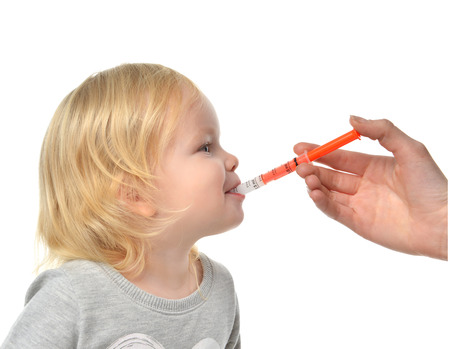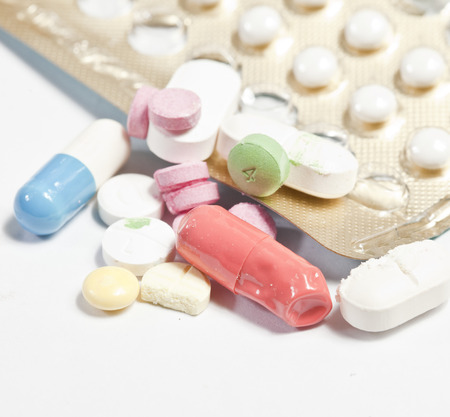In the course of growing up, each and every child will fall sick at some point of time and then will arise the need for medication. As a parent, it is very normal for you to get anxious about what to give your baby or toddler. The lack of proper knowledge and the fear of the unknown disease at times, urges parents to give some over the counter (commonly used medicines that are available without prescription) to the child for quick and temporary relief. The action may be for the good of the child, but it is very essential to know what medications should not be given to children. Some of these medicines are harmful and may even cause serious effects in the child. Here we shall discuss all such medicines that you should never give to your child.

- Over the counter medicines: Cough and baby cold is very common in babies and even older kids. Cough suppressant and cough syrup for kids are not recommended for children below the age of 3 years. Cough syrup has side effects like drowsiness, stomach upset and at times a rash over the body. These medicines if given in higher doses can have serious side effects and can even be detrimental. So in case of children, never use the over the counter cough and cold medications that are commonly used by adults. Try humidifiers and home remedies.Home Remedies:
- Honey and ginger juice is very effective for cough remedies and can be given to children above the age of one. Adding a few drops of lemon or a pinch of turmeric powder to the mix will help to ward of the cold attack much faster. This is the best home made cough medicine for children.
- Steaming is considered very effective in treating an attack of cough and cold and can be safely used for any age. But since you will be dealing with hot water and steam you must take special care that the child is not to close to the heat.
- Warm liquids and chicken broth can be given to babies above 6 months of age. The warm will soothe the cough and provide relief to the child.
Cough and cold medicines may be used in children between the age of 4 to 6 years provided it has been prescribed by the treating doctor and is strongly indicated. Cough suppressant may be needed in severe cases. The main concern here is that these medications contain fever lowering drugs too in combination with other decongestants and anti allergic. So if the parent is not aware of it, and gives the cold medication along with another fever lowering medicine like acetaminophen, then the dose would be doubled in the body and lead to unwanted complications. Excessive doses of acetaminophen are known to harm the liver. So one must read the medications very carefully before prescribing it or do so under the guidance and advice of the child’s pediatrician.
- Aspirin : This is one medicine that must never be given to a child. Giving any medication that contains aspirin can harm the child and make him susceptible to a fatal disease called Reyes syndrome. If you are unsure whether the medicine contains aspirin or not, make sure you ask the pharmacist before giving the medicine.In case of simple fever, the child can be given acetaminophen. There are some contraindications of the medicine like vomiting, dehydration, pre-existing liver disease, kidney problems. In all such conditions, check with the pediatrician before giving the acetaminophen.
- Anti emetic Medications: Nausea and vomiting in variable degrees is very common in children. No anti nauseous or anti emetic medication should be given in such cases. The reason is that most cases are mild and tend to resolve on their own. The side effects associated with these medicines are high and should be avoided. Try safer options like giving your child a lime or orange candy to chew on if he has nausea. Identify is the child has motion sickness and take the necessary precautions towards it like avoiding long travels immediately after a meal.
- Medicines Prescribed for Another Person : If there are more than one children in the house then it is common that one is sick and soon the other one also tends to catch it. This is very common in cases of cough and cold. In all such cases, you should remember never to give the medication prescribed for one child to the other child without consulting your doctor. This rule should hold true for homeopathic and naturopathic medicines also as these medicines are prescribed on the basis of individuality and will be ineffective when used for anyone else.

- Expired Medicines and Products : Any medicine or baby product like formula should be used within the stipulated expiry time frame. Once the product is expired the efficacy is lost and it becomes harmful to the child as it can become a source of infection and contamination. You must also avoid using anything that looks different than it did at the time you bought it. Moisture can spoil baby food and formula packs so be very careful when using them.
- Chew-able medicines : Chew-able tablets are available and commonly used by doctors in children but for smaller children, it may not be a good idea to use them. If the child is above four years then he may be able to take it nicely as the tablet will dissolve in the mouth. But 2 or 3 year old kids may find it difficult and can choke on it. So, such chew-able medicines should be given with caution and under adult supervision.
- Adult Medicines : Never use the medications prescribed for an older child or an adult in a baby or toddler even if the symptoms are exactly the same. The main reason is that the dosage is calculated on the basis of the weight and the same dose may not be suitable for a younger child. Giving a high dose can lead to serious complications. Also ensure that whenever you have to give medicines to the child, use the measuring spoon provided in the pack. Never give medicines in approximate doses.



